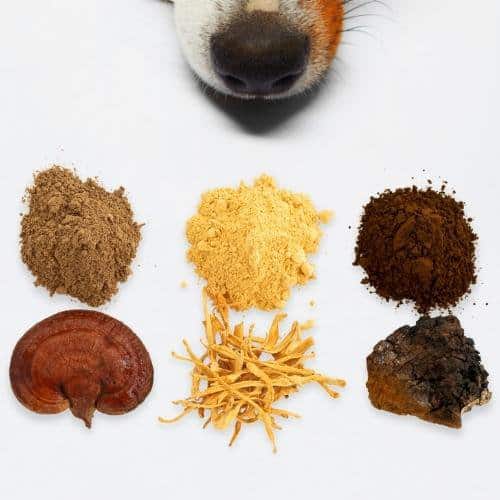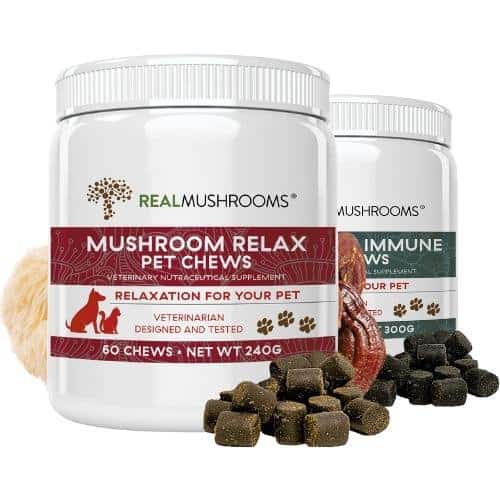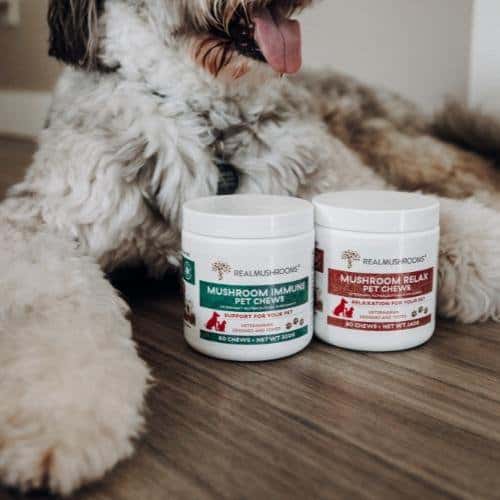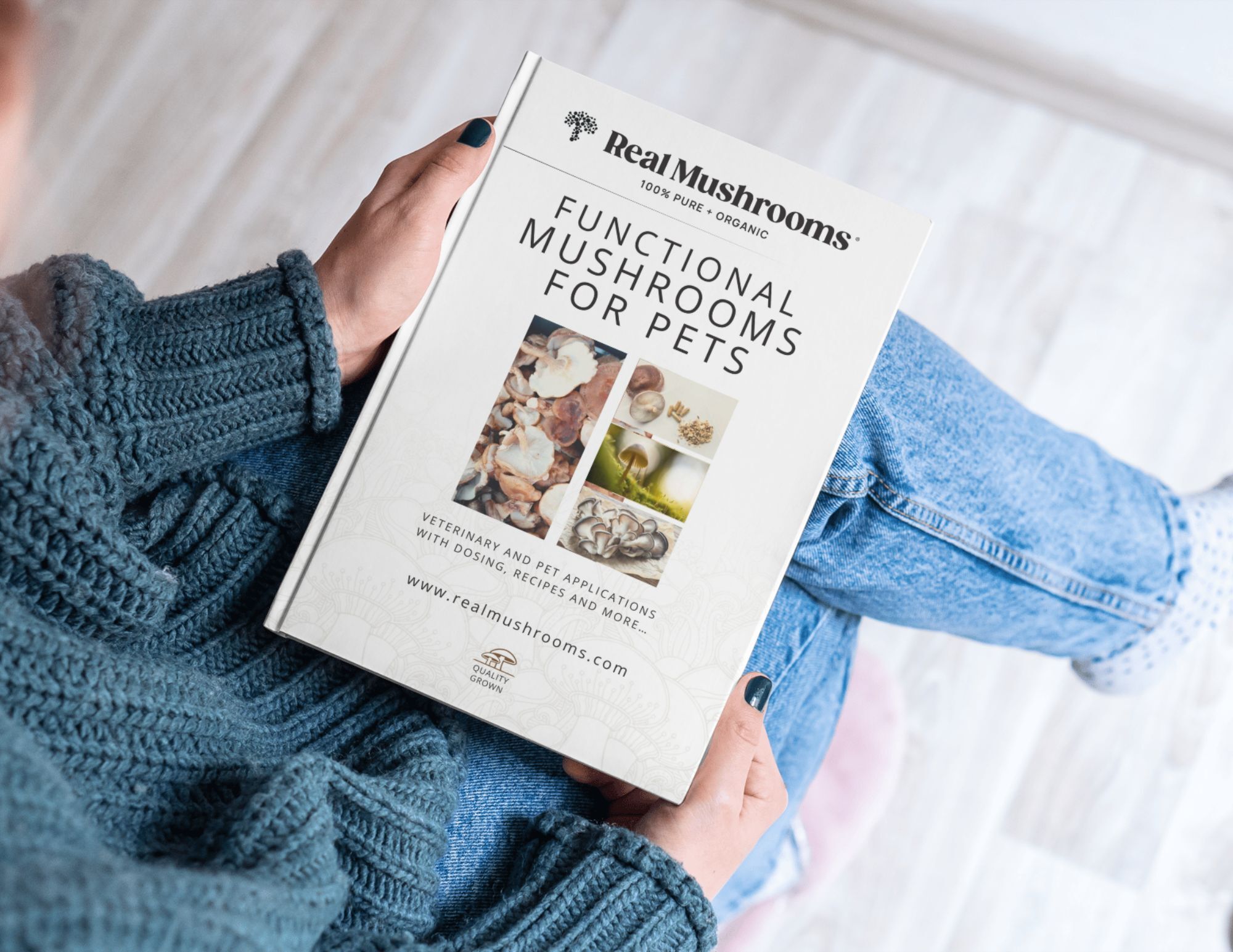Menu


Mushrooms are becoming increasingly popular as a functional food and powerful ally in the holistic medicine toolbox, and with good reason. There is abundant historical data going back thousands of years supporting the benefits of mushrooms in the diet. The peer-reviewed studies are growing as well, with over 2000 results for “medicinal mushrooms” on PubMed.
This same popularity has extended to our companion animals! Fungi are in their heyday, and the potential for mushrooms to benefit our furry friends is significant. But, just how are mushrooms good for dogs and cats and why should you consider using mushroom extracts?
Let’s dive into the details!
Mushrooms have vast and far-reaching benefits, and each variety of fungi has its own unique properties and organ targets. There are, however, beneficial features of mushrooms that are common to all of them.
Throughout their evolution, animals encountered the immune-stimulating effects of fungi, some of which were strong pathogens. These fungal pathogens were strong incentives for animals to develop immune system mechanisms to detect and protect against these pathogens.
This “potential danger” message the body receives when mushrooms are consumed triggers the immune system to be “on alert.”
When mushrooms are consumed (as food or supplement), it activates a form of communication in the body, informing the immune system of where attention is needed to maintain balance and vigor. How does this beneficial immune response occur? Mushrooms are rich in bioactive compounds called polysaccharides, which include beta-glucans.
Beta-glucans are immunomodulating compounds that help to balance the immune system and keep it in optimal working order. Some of the immune cells that beta-glucans interact with are monocytes, natural killer (NK) cells, neutrophils, macrophages, and dendritic cells.
In more simple terms, imagine the immune system to be like a sleeping soldier. Reveille is the bugle signal that sounded at sunrise to call soldiers to duty. When this bugle tune is played, the soldiers rise and prepare for the day, alert to whatever comes their way, prepared to face any threat.
In a similar way, this is what happens when we (or our pets!) consume functional (a.k.a. medicinal) mushrooms such as turkey tail, reishi, lion’s mane, and cordyceps. The mushrooms activate a “wake up and be alert system” in the body, and a message to send resources where needed. The message is “this isn't an emergency, but it could be, so be vigilant.”
So, one of the biggest reasons functional mushrooms are good for dogs and cats is because they help their immune systems be more resilient.
More information on the specific way beta-glucans & polysaccharides facilitate this immune-system “call to vigilance” can be found in our article, A Look at the Powerful Benefits of Beta-D-Glucan.

There is a lot of crossover within these categories. A mushroom can be edible and medicinal. It can be psychoactive and medicinal. It can even be slightly poisonous, edible, and medicinal, as in the case of Amanita muscaria.
The mushrooms I am focusing on in this blog are either edible, medicinal, or both. Examples of mushrooms that are both edible (culinary) and medicinal are: lion’s mane, cordyceps, shiitake, oyster, and maitake. Examples of medicinal mushrooms that are theoretically edible, but just aren’t the kind of mushrooms whose taste and texture are optimal for culinary purposes are: reishi, chaga, and turkey tail.

Mushrooms can be an excellent addition to your pet’s diet. The general rule of thumb is that mushrooms that are safe for humans are also safe for animals. Never feed mushrooms to your pet that you have found in the wild (unless you are an expert at mushroom identification). I buy my mushrooms at the grocery or local farmer’s market. Some of my favorite mushrooms to give my dog Scruffy are oyster, shiitake, and lion’s mane mushrooms.
Mushrooms are highly nutritious! They contain protein, fiber, minerals (selenium), B vitamins, vitamins C and E, are low in digestible carbohydrates and total fat and are high in polyunsaturated fatty acids. The indigestible carbohydrates and soluble fibers in mushrooms support the health of the microbiota. Mushrooms can be an abundant source of vitamin D2 when exposed to UVB light. Mushrooms are also home to unique antioxidants like ergothioneine and glutathione.
Should you decide to give your pet mushrooms as part of their diet, it is recommended that they be cooked. In fact, cooking mushrooms allows more of the medicinal benefits of the mushrooms to be utilized!
That mushrooms should be cooked before feeding them to your pet is due to the fact that all mushrooms contain a component called chitin. Chitin resides in the cell wall of mushrooms and is the same material that makes up the exoskeleton of insects and crustaceans. Chitin decreases the digestibility of mushrooms but has a positive biological role as a dietary fiber.

Hot water extraction is the best practice for increasing the bioavailability of the active ingredients in mushrooms. Therefore I like to add mushrooms to bone broth and slow cook for a long time. I add this mushroom-infused bone broth to my dog’s food.
Utilizing this hot water extraction method or cooking mushrooms breaks down the chitin that makes up the cell wall, which “unlocks” the mushrooms’ important immunomodulatory compounds like beta-glucans (1).
While I sometimes add mushrooms I cook to Scruffy's bowl, I always have a few mushroom supplements in her protocol. The more I read about mushrooms and their benefits, the more enthusiastic I am about making sure my dog always has mushrooms in her system.
Depending on the mushroom, there are also other applications. For instance, cordyceps is ideal for a natural boost of energy and supports lung heath. Lion’s mane can help support cognition and healthy brain function. Reishi can be used as a calming agent and also help improve sleep quality.
Certain mushrooms can also function as adaptogens when ingested. Adaptogens are stress-response modifiers that enhance the tone, vigor, and function of the body.
Adaptogens help the body “adapt” more easily to physical and emotional stresses when used daily over the long term. Here are some more benefits that adaptogens can provide:
• Increase attention and endurance
• Reduce stress-induced impairments and disorders related to the neuroendocrine and immune systems
• Key clinical uses include: stress-induced fatigue, impaired attention and mental performance, mental health, poor quality of life, and as an aging tonic
• Adaptogens help the body to better adapt to stressors by fine-tuning the stress response (2).
My favorite mushrooms to use as adaptogens are cordyceps( energy, respiration), and reishi ( longevity, calming), and chaga (gut health).

The fact that mushrooms share so many beneficial qualities is wonderful, but it can also make choosing a specific mushroom to add to our pets’ regimen confusing.
If you are considering mushrooms to support a specific health condition, it is a good idea to talk to your veterinarian about which mushroom would be best. I also recommend reading Dr. Rob Silver’s article Can Dogs Eat Mushrooms? Facts About Fungi for Your Furry Friend.
If you are interested in proactively supporting your dog or cat with mushrooms and they don't have any specific health conditions, I suggest providing a combination of medicinal mushrooms.
Veterinarian Dr. Barbara Fougere does a lot of work with mushrooms and has found that she sees the best results when her patients are on mushroom combos. She feels that mushrooms work better in synergy. A wonderful combination mushroom product is our Real Mushrooms 5 Defenders for Pets.
There are a variety of ways to add mushrooms to your pets’ diet. As mentioned above, cooking mushrooms and adding them to your pet’s bowl is always a good option, although most likely not for cats. Always start with a small portion of mushrooms when adding them (or any new food) to your pet's bowl.
Mushroom supplements in the form of capsules, powders, or “soft chews” are the most efficient way to assure your pet is getting their daily mushroom dose. Capsules can be hidden in the food or a pill pocket. They can also be opened and sprinkled on your pets’ food. Powders can be mixed in with food or added to bone broth.
Some pets are very wary of anything added to their food. It is for this reason that Real Mushrooms has created mushroom soft chews. These chews can be given like a treat! Real Mushrooms’ line of soft chews includes one for calming and relaxing your pet (Mushroom Relax) and one for supporting your pet’s immune system (Mushroom Immune).

Real Mushrooms has recently launched a Pet line, with products specifically created for your dog or cat. They added this new pet line because so many pet parents were buying the Real Mushrooms “human” products. Dr. Rob Silver, Chief Veterinary Officer for Real Mushrooms, has created a line of products that is safe for pets, with pet dosages listed on the bottles. We have many more pet products coming! See our current line of mushroom products for pets here.
It’s important to have realistic expectations about mushrooms for your dog or cat. Mushrooms work best over time, so if you don't see immediate results that doesn't mean that the mushrooms aren't adding a benefit. Mushrooms are most beneficial given daily over the lifetime of your pet, or as an addition to a protocol to address a medical condition.
Mushrooms should be part of a well-rounded and robust regimen for your pet that includes healthy food, herbs, exercise, and mental stimulation/play.
Learn more about mushrooms for pets in our other articles:

1) János Vetter. December 2007. Chitin content of cultivated mushrooms Agaricus bisporus, Pleurotus ostreatus and Lentinula edodes. Food Chemistry 102 (2007) 6-9. https://www.researchgate.net/publication/222696666_Chitin_content_of_cultivated_mushrooms_Agaricus_bisporus_Pleurotus_ostreatus_and_Lentinula_edodes
2) Panossian A, Seo EJ, Efferth T. Phytomedicine. 2018 Nov 15;50:257-284. Epub 2018 Sep 20.
Disclaimer: The information or products mentioned in this article are provided as information resources only, and are not to be used or relied on to diagnose, treat, cure, or prevent any disease. This information does not create any patient-doctor relationship, and should not be used as a substitute for professional diagnosis and treatment. The information is intended for health care professionals only. The statements made in this article have not been evaluated by the Food and Drug Administration. Any products mentioned are not intended to diagnose, treat, cure, or prevent any disease. The information in this article is intended for educational purposes. The information is not intended to replace medical advice offered by licensed medical physicians. Please consult your doctor or health practitioner for any medical advice.

– Plus, Enjoy Exclusive Tips and Updates with Our Real Mushrooms for Pets Newsletter